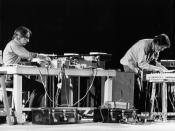John Cage's idea of composing chance music was not arbitrary. His motives were inspired by Eastern philosophy, especially Zen Buddhism. Its influence was so deep on Cage that some people argue he was more of a philosopher than a composer. Many different philosophical elements were combined to create unique processes and approaches, resulting in the development of chance music.
Sound and nature, which were closely related to each other in Cage's context, fascinated him very much. Cage believed that any sound or noise we hear is music, and thus the distinctions between life and art should be eliminated. Everything that surrounds us from clock ticking in our room to cars honking outside our apartment is music. Consequently, Cage composed 4'33", a composition containing four minutes and thirty-three seconds of "silence". When pianist David Tudor first performed it in 1952, some people thought it was a joke, but others acknowledged Cage's effort in removing the creative input from musical composition.
Another major source of influence for John Cage was the I Ching. I Ching, also known as the Book of Changes, originated in China around 256 B.C. It was used to predict the future by tossing sticks or throwing coins. Later on, it became a book of philosophy instead of a fortuneteller's manual. The Americans were exposed to the book in 1951 after it went through European filter and after the German version was translated into English. Cage's interest in this method has led him to produce Fontana Mix in 1958, his first taped work involving indeterminacy.
The following quote best sums up Cage's outlook on art and the element of "chance": "The philosophy, religion, and art of the West assumed that humans, created in the image of God, were destined to rule over nature. From a non-Western perspective,


